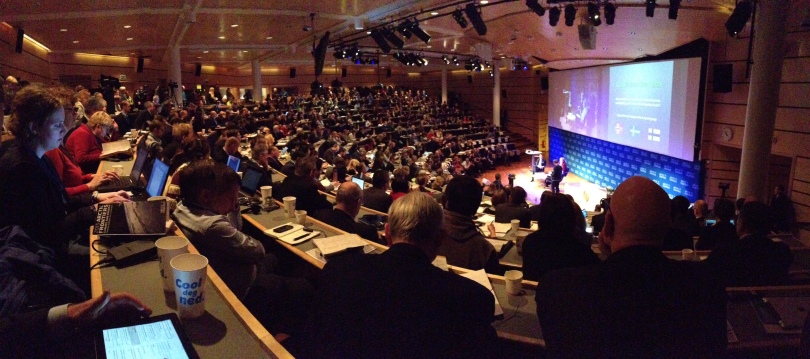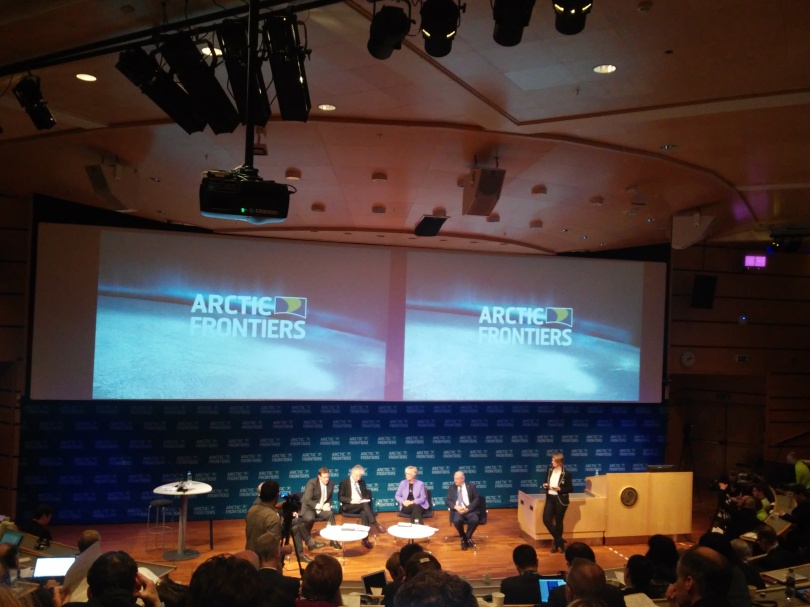The Monday theme was focused around the State of the Arctic in 2015 in the morning, followed by talks on Climate and Energy in the afternoon. The morning session stressed the vulnerability of the Arctic to climate change, the need to raise awareness, and actions towards international cooperation that must be taken in order to reach these goals. I found this as a stark contrast to the afternoon session on Climate and Energy where we heard from several high powered oil executives – Norwegian Statoil, China National Petroleum, as well as American owned Conoco Phillips.

I know that we need oil and fossil fuels to continue our way of life until alternative energies are more efficient and cost effective, but the tales the oil executives told, were ones of prosperity and glory. I don’t think that tale holds when combined with the Arctic, especially if those resources do not remain untouched. Thus, the afternoon session seemed to be in direct contrast with the morning session on the need to mitigate climate change, however this was rather inconspicuous during the speeches from the oil executives. Perhaps I just have a biased view of fossil fuel consumption. Today, I met with an old friend who I met while studying in Oslo, and she told me of the scary stories of Norweigan forest land being sold to foreign investment companies, such as Chinese National Petroleum which recently bought some of Lyngen, and apparently Svalbard. This made me think how great an opportunity it would have been for the audience to be able to ask direct questions of the presenters, especially the oil executives. Why not put a little heat on them? I appreciate that the moderator had strong pointed questions, but often the presenters got away with not giving a direct answer, and essentially evading questions about environmental or safety concerns.

Furthermore, there has been a lot of talk about economic development of the north, but what really does this mean for conservation? Tuesday’s session included a talk about ecological winners and losers of climate change in the Arctic which I think was one of the only talks thus far which really addressed these issues, along with Samantha Smith of the WWF-Norway. I was a bit surprised by the relative lack of these issues presented during the policy session. I guess they will come more with the science sessions in the next couple days, once the politicians have left. Wednesday I also had the opportunity to attend the business session on mining in the Arctic, which was across town at the Edge Hotel. At the morning science session, questions were welcome from the audience at the end of the talk. Arriving at the business session, I was again surprised by the lack of open dialogue with the audience, as well as the difference of appearance, many more suits, and weighted on the male side.
In general, coming from a science background where I mostly attend conferences solely made up of scientists, I appreciate the different and varied perspective that the policy and business sessions bring. Hearing from politicians, prime ministers, and oil executives is something I have never been exposed to at an academic conference. Thus, I think this is a very unique experience and I feel very fortunate to be able to attend and participate in the Young Scientists Forum. I am looking forward to seeing what the next days bring.
(text: Alia Khan; photos: Cory Matthews (upper), Katrine Brink Claassen (lower))
